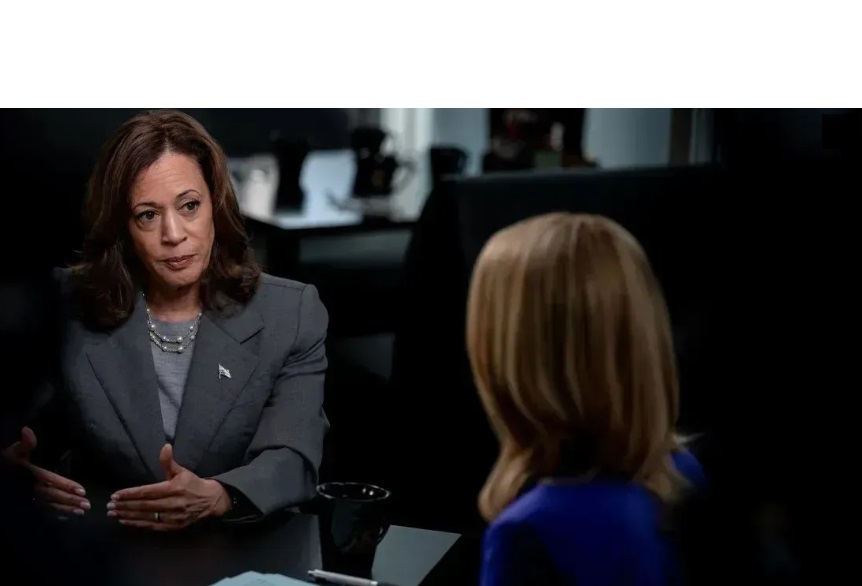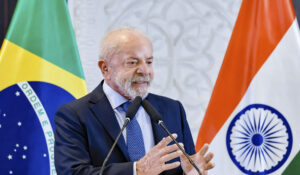
Published 08/30/2024 09:59 | Edited 08/30/2024 10:46
Democrat Kamala Harris gave her first interview as a candidate for president of the United States this Thursday (29). Alongside her running mate, Minnesota Governor Tim Walz, Harris spoke for approximately 27 minutes to CNN during an event in the state of Georgia.
“I think people are ready for a new path,” the candidate commented on “the hope and optimism” that has taken hold of “every generation of Americans” since the start of the revamped and energized Democratic campaign.
The current US vice president advocated a turning point in American politics, explained changes in positioning regarding fossil fuel extraction and immigration and described the moment when current President Joe Biden told her he was abandoning the race for the White House, in the November 5 elections.
Democratic advisors feared that any major slip-up by Kamala would damage the campaign that had been considered impeccable up until now, given that the former prosecutor has a history of facing difficulties in direct confrontations with the press.
In the very first question, Kamala was asked what she would do on her first day in office if she were elected in November. “First and foremost, one of my biggest priorities is to do everything we can to support and strengthen the middle class,” she responded, setting the tone for what has been the main campaign theme to differentiate the Democratic campaign, focused on working families from the so-called American middle class, from the Republican campaign, centered on the figure of tycoon Donald Trump and his intentions to cut taxes for the rich.
Kamala promised to implement what she called an opportunity economy to “reduce the cost of everyday goods” by investing in American small businesses and families.
The vice president mentioned the creation of a $6,000 tax credit for families with babies in their first year of life (“to help them buy a car seat, to help them buy baby clothes, a crib”) and investment around affordable housing, “a big issue in our country.”
The reporter then tried to corner Kamala by mentioning inflation in the United States, which has been eroding the purchasing power of the American working class.
“You’re well aware that right now many Americans are struggling. There’s an affordability crisis. One of your campaign themes is, ‘We’re not going back.’ But I wonder what you would say to voters who want to go back on the economy, specifically because their groceries were cheaper and housing was more affordable when Donald Trump was president?” Bash asked.
“When Joe Biden and I took over the White House we saw 10 million people unemployed, hundreds dying from Covid and the economy was broken,” Kamala responded.
“In large part, this is all because of Donald Trump’s mismanagement of this crisis. When we came in, our top priority was to do what we could to rescue America. And today we know that we have inflation below 3%. Many of our policies have led to the US being the fastest country to recover compared to any other rich nation in the world,” he said.
Kamala acknowledged, however, that rising prices are a reality and promised to combat them. “But you’re right. Prices, particularly for food, are still high. The American people know that. I know that. That’s why my agenda includes what we need to do to reduce food prices,” she countered.
Changing positions on fossil fuels and immigration
The US vice president offered a more comprehensive explanation today about why she has changed some of her positions on oil drilling and immigration. Kamala said her values have not changed, but that her time as vice president has provided her with a new perspective on some of the country’s most pressing issues.
“How should voters look at some of the changes you’ve made?” Bash asked Kamala.
“I think the most important and meaningful aspect of my perspective and policy decisions is that my values have not changed,” the vice president said. “You mentioned the Green New Deal. I have always believed — and worked on — that the climate crisis is real, that it is an urgent issue to which we must apply metrics that include staying within timeframes around the clock.”
At a debate on the climate crisis in September 2019, Kamala was asked whether she would commit to implementing a federal ban on oil drilling on her first day in office.
“There’s no question that I’m in favor of banning fracking and starting with what we can do on Day 1 around public lands,” Kamala said at the time.
“We have set targets for the United States of America, and by extension the world, around when we must meet certain standards for reducing greenhouse gas emissions, as one example. That target has not changed,” the vice president said in the interview on Thursday. “What I have seen is that we can grow and we can grow a thriving clean energy economy without banning fracking,” she added.
On immigration, Kamala pointed to her record as California attorney general, when she prosecuted gangs accused of cross-border trafficking, as an indication of her values on the issue.
“My values haven’t changed. So that’s the reality. And four years as vice president, I’ll tell you, one of the aspects, to your point, is traveling the country extensively,” she said, pointing to her 17 visits to Georgia since becoming vice president.
Joe Biden’s Call
Describing the Sunday in July when Biden, after weeks of pressure, announced his decision to withdraw from the race, Kamala said she was at home making pancakes and bacon for her nieces when the phone rang.
“It was Joe Biden, and he told me what he had decided to do. And I asked him, ‘Are you sure?’ And he said, ‘Yes,’” she recalled, adding, “My first thought wasn’t about me, to be honest with you. My first thought was about him.”
Source: vermelho.org.br

